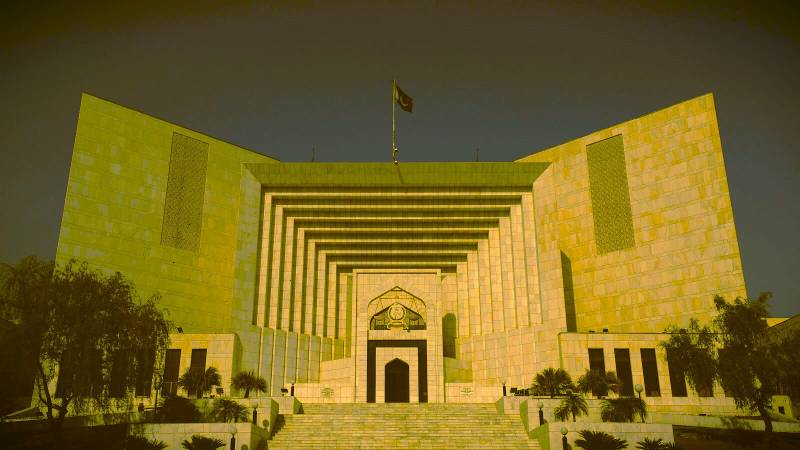
Former spy chief Lieutenant General (retired) Faiz Hameed was given a reprieve on Wednesday after the Supreme Court disposed of a petition filed against him.
Instead, the top court has raised serious reservations about the procedure whereby cases are entertained in the Human Rights Cell (HRC) of the Supreme Court.
Moeez Ahmed Khan, the head of a housing society in Islamabad called 'Top City', had filed a petition with the top court's HRC, seeking action against former Inter-Services Intelligence (ISI) Director General Lt Gen (retd) Faiz Hameed over his alleged role in attempting to grab land and stealing valuables from him.
"On May 12, 2017, my house and office were raided on the orders of General (Rtd) Faiz Hameed. During the raid, valuables and records of our private housing society were stolen," Moeez claimed.
He added that the purpose of the illegal proceedings against him was to usurp control of Top City-1, one of the projects under Top City.
"After the raid, I, along with my five other colleagues, were kept in confinement," Moeez stated, urging the federal government to take action against Gen (Rtd) Faiz Hameed, his brother Najaf and others.
On Wednesday, a three-member bench headed by Chief Justice of Pakistan (CJP) Qazi Faez Isa and comprising Justice Athar Minallah and Justice Aminuddin Khan heard the case.
At the outset of the hearing, CJP Isa informed the petitioner that he had levelled serious allegations against a state official.
The bench was informed that Gen (retd) Hameed had abducted Moeez along with five others and kept them in illegal confinement.
"What should the court do?" CJP Isa inquired.
Moeez's lawyer urged the bench to order the Ministry of Defence to take action against Gen (retired) Hameed.
However, CJP Isa inquired whether such a case had ever been heard in the Supreme Court before.
At this, the counsel for Top City's CEO responded that this was the first time their plea had been scheduled for a hearing.
CJP Isa pointed out that the case reminded him of a petition filed by another Pakistani expat, Zahida Javed Aslam, who too had filed a petition in the apex court's human rights cell alleging that Moeez — who is the owner of TopCity-1 - had fraudulently transferred her properties in his name.
Zahida Javed, CJP Isa pointed out, had filed the case in 2017 under Article 184/3 in the human rights cell. The chief justice added that former chief justice Saqib Nisar heard her case in his chamber.
"Chief justice cannot take matters outside the legal jurisdiction. How did the hearing take place when the matter did not come under judicial jurisdiction?" asked Justice Minallah.
During the hearing, CJP Isa decided to summon the head of the HRC to inquire about the cell, when it was established, its operations and its legality.
The HRC director general told the bench that the cell was established in 2005 through a circular while the matter of rules to regulate it was in place before a full court meeting. However, no decision on this matter has ever been taken by a full court meeting.
CJP Isa pointed out that on September 18, he had headed the first full-court meet since 2019.
He further inquired whether former chief justice Saqib Nisar heard HRC cases in-chamber and under what law. He also inquired whether CJP Nisar used to seek reports in his chamber?
The director general of the cell confirmed that CJP Nisar used to hear cases in his chamber but had no judicial powers to do so.
Justice Minallah asked whether the HRC had disposed of its record.
On this, the HRC chief made the startling disclosure that more than 300,000 applications pending with the HRC were ordered to be incinerated by CJP Nisar.
Justice Minullah raised questions over the legality of the HRC, noting Article 184(3) grants the chief justice and the top court space to take action over the violation of fundamental rights. Hence, he observed that the HRC was unconstitutional.
Justice Minullah further observed that by establishing the HRC in 2005, a parallel judicial system was being run in the country without any constitutional cover.
Chief Justice Isa observed that proceedings of the Supreme Court cannot take place in chambers.
"Only chamber appeals can be held in the chamber," he clarified.
CJP Isa further observed that a chief justice cannot issue any order in his chamber. Hence, while disposing of Zahida Aslam's application, the top court held that CJP Nisar's orders issued in-chamber have no legal standing.
During Wednesday's hearing, the additional attorney general argued that the petitioner could approach the Ministry of Defence for remedy.
Subsequently, the top court disposed of the petition and told the petitioner they could approach other relevant forums to seek remedy.
"The Supreme Court has disposed of the petition without discussing the merits of the case," it added.
Justice Minallah cautioned not to deem every matter as falling under the jurisdiction of Article 184(3).

